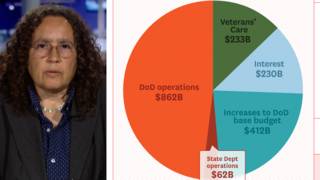
Topics
By Amy Goodman with Denis Moynihan
Hours after 400,000 people joined in the largest climate march in history, the United States began bombing Syria, starting yet another war. The Pentagon claims that the targets were military installations of the Islamic State, in Syria and Iraq, as well a newly revealed terrorist outfit, the Khorasan group. President Barack Obama is again leading the way to war, while simultaneously failing to address our rapidly worsening climate. The world is beset with twin crises, inextricably linked: global warming and global warring. Solutions to both exist, but won’t be achieved by bombing.
“In today’s wars, many more civilians are killed than soldiers; the seeds of future conflict are sown, economies are wrecked, civil societies torn asunder, refugees amassed, children scarred.” These words were spoken on Dec. 10, 2009, by that year’s Nobel Peace Prize winner, President Barack Obama. Five years later, his pronouncement reads like a daily headline. The peace group Code Pink is calling on President Obama to return his Nobel medal.
“The world must come together to confront climate change,” Obama said in that same Nobel acceptance speech. “There is little scientific dispute that if we do nothing, we will face more drought, more famine, more mass displacement—all of which will fuel more conflict for decades.” Obama even made the key point that “it is not merely scientists and environmental activists who call for swift and forceful action—it’s military leaders in my own country and others who understand our common security hangs in the balance.”
Indeed, the Pentagon has long considered climate change to be a major threat to the national security of the United States. In its 2014 Quadrennial Defense Review, the Pentagon noted that the many impacts of climate change “will aggravate stressors abroad such as poverty, environmental degradation, political instability, and social tensions—conditions that can enable terrorist activity and other forms of violence.”
So it is fair to ask, why not address the threat of climate change when it is still possible? Asad Rehman, of the international environmental group Friends of the Earth, who was in New York for the climate march, told me, “If we can find the trillions [of dollars] we’re finding for conflict whether there’s been the invasion in Iraq or Afghanistan or now the conflict in Syria, then we can find the kind of money that’s required for the transformation that will deliver clean, renewable energy.”
Rehman clearly opposes massive military spending. He spent years as an anti-war organizer, and sees the deep connection between warring and warming. “Oil has been a curse on the people of the Middle East,” he added. “It has been a harbinger of conflict and violence and of destruction of ancient civilizations in communities and the lives of millions of people.”
Medea Benjamin, a co-founder of Code Pink, echoed the words of Rehman. She participated in the historic climate march, and joined thousands more the next day to “Flood Wall Street,” where 100 people were arrested. Before heading to the White House to protest the bombing of Syria, she told me: “Oil is the basis of U.S. policy in the Middle East. Were it not for Iraq’s oil, the U.S. would have never invaded.”
On Tuesday, more than 100 world leaders, along with industry representatives, participated in a nonbinding U.N. climate summit. It was convened by Secretary-General Ban Ki-moon in the hopes that it would build momentum for the ongoing formal climate talks, which seek a binding commitment from the nations of the world to drastically cut greenhouse-gas emissions, and to limit the global rise in temperature to 2 degrees Celsius. Many believe a 2-degree rise is the upper limit of increase that the planet—as we know it—can sustain.
While climate talks generate little success or media coverage, President Obama’s attack on the Islamic State and other perceived terrorist threats dominated the U.N. General Assembly and a special session of the Security Council session that Obama chaired. Reflecting on the prospects for progress on the global movement to stop climate change, Asad Rehman said, “Anybody who went on that demonstration could only walk away energized and more committed that the power lies in our hands and not in that building here in New York, in the U.N.”
Before the 2003 invasion of Iraq, U.S. Gen. Anthony Zinni predicted success only with an invading force of 400,000. Donald Rumsfeld went in with less than half, famously quipping, “You go to war with the army you have—not the army you might want.” Well, 400,000 people turned out for the climate march last Sunday … an army of hope for a sustainable future.
Amy Goodman is the host of Democracy Now!, a daily international TV/radio news hour airing on more than 1,200 stations in North America. She is the co-author of “The Silenced Majority,” a New York Times best-seller.
© 2014 Amy Goodman / Distributed by King Features Syndicate
Listen to and share Amy Goodman’s podcast on SoundCloud.












Media Options